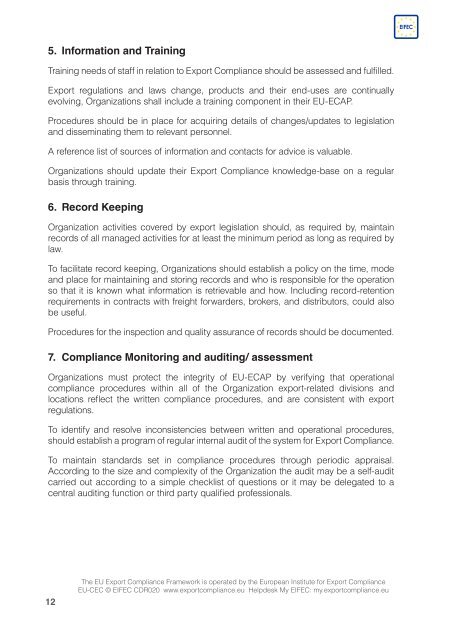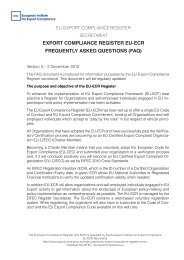European Charter for Export Compliance EU-CEC EU-ECF EU ...
European Charter for Export Compliance EU-CEC EU-ECF EU ...
European Charter for Export Compliance EU-CEC EU-ECF EU ...
Create successful ePaper yourself
Turn your PDF publications into a flip-book with our unique Google optimized e-Paper software.
5. In<strong>for</strong>mation and Training<br />
Training needs of staff in relation to <strong>Export</strong> <strong>Compliance</strong> should be assessed and fulfilled.<br />
<strong>Export</strong> regulations and laws change, products and their end-uses are continually<br />
evolving, Organizations shall include a training component in their <strong>EU</strong>-ECAP.<br />
Procedures should be in place <strong>for</strong> acquiring details of changes/updates to legislation<br />
and disseminating them to relevant personnel.<br />
A reference list of sources of in<strong>for</strong>mation and contacts <strong>for</strong> advice is valuable.<br />
Organizations should update their <strong>Export</strong> <strong>Compliance</strong> knowledge-base on a regular<br />
basis through training.<br />
6. Record Keeping<br />
Organization activities covered by export legislation should, as required by, maintain<br />
records of all managed activities <strong>for</strong> at least the minimum period as long as required by<br />
law.<br />
To facilitate record keeping, Organizations should establish a policy on the time, mode<br />
and place <strong>for</strong> maintaining and storing records and who is responsible <strong>for</strong> the operation<br />
so that it is known what in<strong>for</strong>mation is retrievable and how. Including record-retention<br />
requirements in contracts with freight <strong>for</strong>warders, brokers, and distributors, could also<br />
be useful.<br />
Procedures <strong>for</strong> the inspection and quality assurance of records should be documented.<br />
7. <strong>Compliance</strong> Monitoring and auditing/ assessment<br />
Organizations must protect the integrity of <strong>EU</strong>-ECAP by verifying that operational<br />
compliance procedures within all of the Organization export-related divisions and<br />
locations reflect the written compliance procedures, and are consistent with export<br />
regulations.<br />
To identify and resolve inconsistencies between written and operational procedures,<br />
should establish a program of regular internal audit of the system <strong>for</strong> <strong>Export</strong> <strong>Compliance</strong>.<br />
To maintain standards set in compliance procedures through periodic appraisal.<br />
According to the size and complexity of the Organization the audit may be a self-audit<br />
carried out according to a simple checklist of questions or it may be delegated to a<br />
central auditing function or third party qualified professionals.<br />
12<br />
The <strong>EU</strong> <strong>Export</strong> <strong>Compliance</strong> Framework is operated by the <strong>European</strong> Institute <strong>for</strong> <strong>Export</strong> <strong>Compliance</strong><br />
<strong>EU</strong>-<strong>CEC</strong> © EIFEC CDR020 www.exportcompliance.eu Helpdesk My EIFEC: my.exportcompliance.eu<br />
EIFEC



